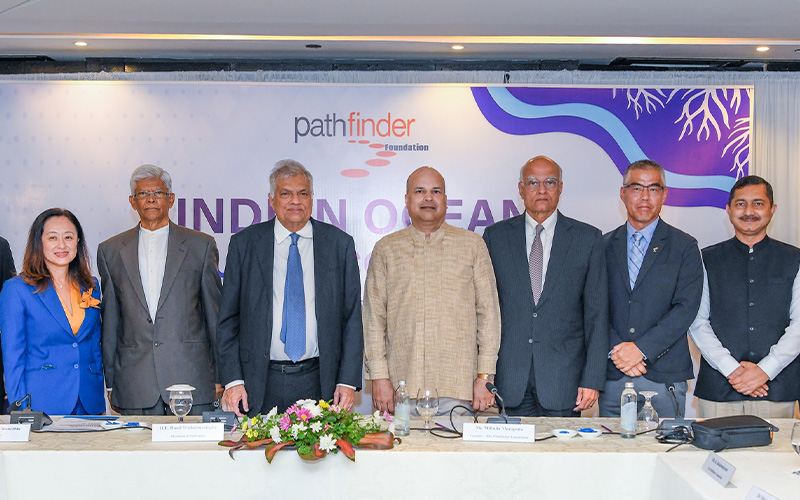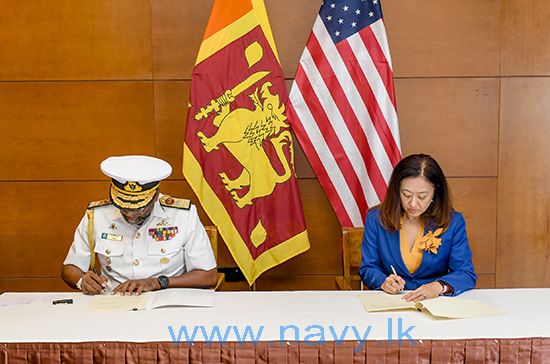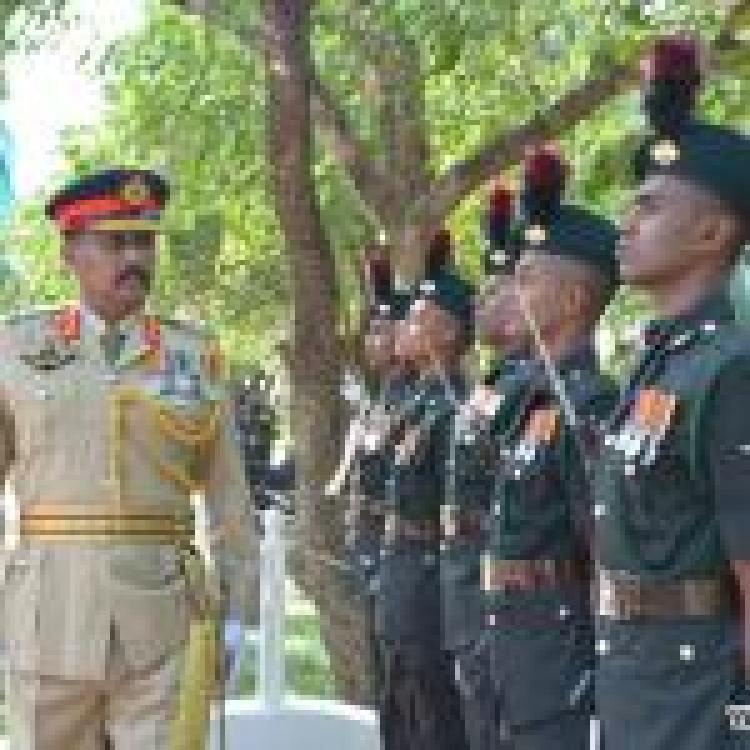Only days after gifting the Sri Lankan Navy, the fourth Coast Guard Cutter, the US is seen making a concentrated effort to enhance its defence corporation by funding a capacity-building project to increase port security, despite concerns of rampant militarisation.
US Ambassador to Sri Lanka, Julie J. Chung speaking at the Pathfinder Foundation’s Indian Ocean Security Conference thanked Sri Lanka for broadening its role by sending one of the donated cutters to support Operation Prosperity Guardian, against the Houthis in Yemen. “This is a clear demonstration of Sri Lanka playing an active role in helping to secure the global supply chain that benefits both Sri Lanka and economies around the world. Thanking Sri Lanka for this leadership was an important message conveyed during the recent visits of U.S. Deputy Secretary of State Richard Verma, and others.”

She said that the Sri Lankan Navy joined a multinational coalition of naval vessels in the Red Sea, Gulf of Aden, and the Arabian Sea to help ensure secure access along sea lanes to commercial ships from Houthi attacks.
Meanwhile, a delegation led by the U.S. Ambassador to Sri Lanka met with the Commander of the Sri Lanka Navy, Vice Admiral Priyantha Perera at the Navy Headquarters to sign a Memorandum of Understanding (MoU) between the U.S. National Nuclear Security Administration and Sri Lanka Navy.
According to an announcement posted on the Sri Lanka Navy website, the MoU addresses bilateral cooperation to detect and interdict illicit trafficking in special nuclear material and other radioactive material through technical and methodological cooperation, including the installation and improvement of technical systems for the detection and identification of such material at border crossing control points of Sri Lanka.
In addition to this, the US government is also funding a capacity building program by Colombo plan that will see experts being sent to study ports in the US to build up on cyber security capabilities. Ambassador Chung said this will “give the Sri Lanka Ports Authority the know-how and technical expertise to innovate port operations and expose SLPA staff to the latest international standards and best practices.”
She added that this will help protect infrastructure from cyber and ransomware attacks which is of “importance for all our national securities.”
The US continues to maintain close military ties with Sri Lanka, despite its history of mass atrocities. Last year the US ambassador met with an accused war criminal and acting defence secretary Kamal Gunaratne to discuss "training opportunities"
Gunaratne, in particular, stands accused of overseeing a litany of war crimes. He was commander of the army’s infamous 53 Division during the 2009 massacres, and allegedly oversaw numerous abuses, including sexual violence, summary executions and the disappearance of those who surrendered to the military.
Read more: Who are Sri Lanka Army’s 53 Division? (Channel 4)
The 53 Division is responsible for the killing of Tamil TV presenter, Isaipriya, who surrendered to the Sri Lankan military in 2009. A UN investigation concluded that the 53 Division initially claimed responsibility for her killing.
The investigation found:
“Reasonable grounds to believe that security forces captured Isaipriya alive and then killed her with gunshots to the head execution style. Further, based on the images of Isaipriya’s dead body and those of many other women, the OISL believes that Isaipriya’s dead body was desecrated.”
The OHCHR Investigation into Sri Lanka (OISL) also found “reasonable grounds to say the 53 Division while commanded by Gunaratne was involved in attacks on hospitals and civilians in three ‘No Fire Zones,’ summary execution and torture,” according to an ITJP dossier on Gunaratne.
After the war ended, Gunaratne went on to run one of Sri Lanka’s most notorious torture camps in Vavuniya.
In 2017, he told an audience that “traitors” who attempt to divide Sri Lankan by introducing a new constitution must be killed. He went on to slam attempts to introduce a new constitution as “on the requirement of the Western forces and Tamil Diaspora to please Tamil separatists”.
Though Chung continues to meet with Gunaratne, there have been calls from British parliamentarians as recent as last year calling for him to face sanctions.
A report published by the International Truth and Justice Project in 2019 detailed how the Sri Lankan Navy was involved in serious crimes including torture, dissaperances and murders.
The report, entitled “The Sri Lankan Navy: Turning a Collective Blind Eye”, compiled interviews from torture survivors as well as Sri Lankan naval officers, alongside court documents to explore details around a formerly secret Navy torture camp in Trincomalee.
“The Trincomalee 11 abduction case was supposed to be the great success story of Sri Lankan justice but tragically it’s become emblematic of failure,” said the ITJP’s Executive Director, Yasmin Sooka. “Many senior naval officers in the command structure in charge of naval intelligence or stationed at Trincomalee haven’t even been questioned, alleged perpetrators have been protected and promoted, and the living victims never even interviewed.”
The report, which examines the complicity of the Sri Lankan Navy in torture and enforced disappearances over many years, found that “these violations were part of a wider pattern of systemic torture that occurred over many years and in multiple sites, perpetrated by the Sri Lankan Navy and other units of the security forces”.
“Naval officers we have spoken to, say everyone knew they should turn ‘a collective blind eye’ to what was going on,” added Sooka. “The whole Navy command structure appears to have been complicit in violations and is seriously tainted.”
Though the report only explored in-depth the Trincomalee site, it found that other similar secret sites existed on the island. For example, a location in Mannar was also used by the navy as a site of human rights violations, with bodies of detainees “allegedly disposed of at sea” as was the same in Trincomalee.
The report goes on to conclude:
“The entire Sri Lankan Navy should be sanctioned by the international community with the suspension of international assistance and cooperation until, at the very minimum, the navy cooperates fully with an independent police investigation and stops rewarding the suspects in this emblematic case by promoting them or making it possible for them not to face the full might of the law.”
"International partners are now on notice and can no longer turn a blind eye to the Sri Lankan Navy’s criminality either.”


